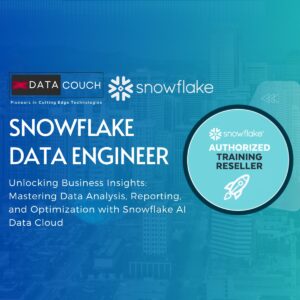
Snowflake Data Engineer
Leveraging Business Intelligence: Advanced Data...
DataCouch Academy | Best-in-class training on Generative AI, Cybersecurity and more

Building Intelligent Solutions with Generative AI.
Be at the Forefront of Cutting-Edge Technology in Delivering Ultimate Solutions! Join Our Exclusive Workshop to Unleash Your Creativity with Generative AI!
Are you ready to dive into the world of cutting-edge technology? Join us for our exclusive workshop, “Generative AI for Developers | Level 1,” where you’ll embark on a transformative journey into the realm of artificial intelligence. Whether you’re a seasoned developer, an AI enthusiast, or a data scientist eager to expand your horizons, this event is tailored just for you.
During this immersive workshop, participants will explore the fundamentals of Generative AI, delving deep into its methodologies and practical applications. Led by industry experts, you’ll gain hands-on experience and invaluable insights into harnessing the power of Generative AI to revolutionize your projects.
Key Outcomes and Benefits:
Who Should Attend:
Prerequisites:
Don’t miss this opportunity to unlock your creative potential with Generative AI. Reserve your spot today and embark on a journey of innovation and discovery!
Recap of DeepLearning
Deep Learning on Azure
Evolution of Natural Language Processing
Getting started with Generative AI
Large Language Models (LLMs)
Evaluating LLMs
Fine Tuning Basics
Scaling Human Feedback
Lab(s): Text Generation on Azure OpenAI
OpenAI’s GPT Models and BERT Model
Introduction to AutoGPT
GPT-4: Fully Autonomous Models
AutoGPT Use Cases
Leveraging Business Intelligence: Advanced Data...
Driving Transformation, Efficiency, and Strategy...
Revolutionize your Data Lakehouse efficiency...